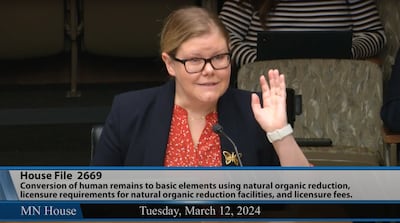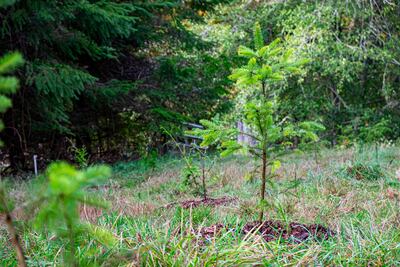In March last year, a terminally ill man named Steve Wheeler walked into the office of a green funeral home in the US state of Minnesota and asked for something he knew was illegal.
Mr Wheeler, a social studies teacher, was dying from metastatic cancer and had been thinking about how he would be laid to rest.
“There has got to be something different than dropping this big box in the ground with a body that has all these chemicals and stuff in it," he thought.
After hearing the term “human composting” on a talk show, an intrigued Mr Wheeler began looking into it.
Human composting, also known as natural organic reduction, is the process of turning bodies into nutrient-rich material similar to soil.
A deceased person is typically laid in a cradle surrounded by organic material such as wood chips, alfalfa and straw. That cradle is then placed into a vessel for about 30 days.
Microbes break everything down to the molecular level, resulting in the formation of about one cubic yard of soil, which can be used to enrich conservation land, forests or even gardens.
Many people opt for human composting for environmental reasons, preventing the release of carbon into the atmosphere through traditional cremation or the expanding use of finite land for cemeteries.
Mr Wheeler, however, soon discovered the practice was not available in Minnesota and could only be done in a handful of states at the time. Most notable was Washington, which became the first to legalise natural organic reduction in 2019.
That is also when he met Taelor Johnson.
“I had just been to the first ever body composting conference in Denver,” Ms Johnson told The National. “It was interesting how this all came about for us.”
Ms Johnson, who is vice president and director of communications at Interra Green Burial by Mueller Memorial in Minnesota, met various human composting providers at the conference in March last year.
But she connected best with the team from Return Home, a company based in Auburn, Washington, to the south of Seattle.
“We worked out a process right there for us to be able to bring someone from our care into theirs,” Ms Johnson said.
When Mr Wheeler died at the age of 53, she and her team were able to fulfil his dying wish: transferring his body to Auburn for natural organic reduction.
“He was thrilled,” she said. “It created meaning for his own death to know that some good was going to come out of it.”
Watch - Steve Wheeler talks about human composting
Mr Wheeler’s story is not unique. Many people in the US who opt for natural organic reduction are unable to do it in their home state.
At the time of Mr Wheeler’s death, the practice was legal in seven states: Washington, Colorado, Oregon, Vermont, California, New York and Nevada.
But the law was still waiting to go into effect in many of those or was pending further regulatory approval.
Since then, five states have passed bills legalising natural organic reduction and three of those, including Minnesota, approved it in May.
Ms Johnson and a “ragtag team of people” who were passionate about the subject, including former Minnesota state senator Carolyn Laine, worked to get the bill over the line.
“I got to testify in front of the House and Senate and talk about my experience with Steve,” she said. “It got added to a larger bill in Minnesota and got voted through.”
Licensed providers will be able to offer natural organic reduction in the state from July 1, 2025.
“I think once a state does it and shows that it’s working, it’s a lot easier for other states to follow,” Ms Johnson said.
“The message is often about empowering choice and finding more sustainable ways to help people choose their disposition.”
US Catholic groups have been leading the critical charge against the movement to legalise natural organic reduction and the intricacies of the practice.
The Minnesota Catholic Conference deemed it to be disrespectful to the human body.
“The main experience with composting for most of us is related to household waste such as eggshells and food scraps,” a statement from the organisation reads.
“We toss these unwanted scraps into a container to be broken down by bacteria and then spread around the garden.
"Disposing of human bodies this way goes against our common human desire to respect the dead.”
But Ms Johnson, who has attended laying-in ceremonies including Mr Wheeler's in Washington, described the process as “beautiful and meaningful".
She recounted emotional moments from funerals, one in which grieving family members placed their hands on the vessel of their loved one to feel the warmth being produced by the exothermic process.
“What I think is so revolutionary about this is it creates an extended amount of time to separate from your person’s body,” she said.
“You can literally feel the energy of their body even after they’ve died and the heat slowly taper off over time … it’s a stunning experience for people to say goodbye and let them go.”
The five pillars of Islam
UAE currency: the story behind the money in your pockets
Results
5pm: Wathba Stallions Cup Maiden (PA) Dh 70,000 (Dirt) 1,000m, Winner: Hazeem Al Raed, Antonio Fresu (jockey), Ahmed Al Shemaili (trainer)
5.30pm: Handicap (PA) Dh 85,000 (D) 1,000m, Winner: Ghazwan Al Khalediah, Hugo Lebouc, Helal Al Alawi
6pm: Maiden (PA) Dh 70,000 (D) 1,400m, Winner: Dinar Al Khalediah, Patrick Cosgrave, Helal Al Alawi.
6.30pm: Handicap (TB) Dh 70,000 (D) 1,600m, Winner: Faith And Fortune, Sandro Paiva, Ali Rashid Al Raihe.
7pm: Maiden (PA) Dh 70,000 (D) 1,600m, Winner: Only Smoke, Bernardo Pinheiro, Abdallah Al Hammadi.
7.30pm: Handicap (PA) Dh 70,000 (D) 1,600m, Winner: AF Ramz, Saif Al Balushi, Khalifa Al Neyadi.
8pm: Maiden (PA) Dh 70,000 (D) 2,000m, Winner: AF Mass, Tadhg O’Shea, Ernst Oertel.
Killing of Qassem Suleimani
Mohammed bin Zayed Majlis
Zayed Sustainability Prize
Killing of Qassem Suleimani
UAE currency: the story behind the money in your pockets
More from Neighbourhood Watch:
Killing of Qassem Suleimani
Evacuations to France hit by controversy
- Over 500 Gazans have been evacuated to France since November 2023
- Evacuations were paused after a student already in France posted anti-Semitic content and was subsequently expelled to Qatar
- The Foreign Ministry launched a review to determine how authorities failed to detect the posts before her entry
- Artists and researchers fall under a programme called Pause that began in 2017
- It has benefited more than 700 people from 44 countries, including Syria, Turkey, Iran, and Sudan
- Since the start of the Gaza war, it has also included 45 Gazan beneficiaries
- Unlike students, they are allowed to bring their families to France
UAE currency: the story behind the money in your pockets
F1 The Movie
Starring: Brad Pitt, Damson Idris, Kerry Condon, Javier Bardem
Director: Joseph Kosinski
Rating: 4/5
Killing of Qassem Suleimani
In numbers: PKK’s money network in Europe
Germany: PKK collectors typically bring in $18 million in cash a year – amount has trebled since 2010
Revolutionary tax: Investigators say about $2 million a year raised from ‘tax collection’ around Marseille
Extortion: Gunman convicted in 2023 of demanding $10,000 from Kurdish businessman in Stockholm
Drug trade: PKK income claimed by Turkish anti-drugs force in 2024 to be as high as $500 million a year
Denmark: PKK one of two terrorist groups along with Iranian separatists ASMLA to raise “two-digit million amounts”
Contributions: Hundreds of euros expected from typical Kurdish families and thousands from business owners
TV channel: Kurdish Roj TV accounts frozen and went bankrupt after Denmark fined it more than $1 million over PKK links in 2013
Hamilton’s 2017
Australia - 2nd; China - 1st; Bahrain - 2nd; Russia - 4th; Spain - 1st; Monaco - 7th; Canada - 1st; Azerbaijan - 5th; Austria - 4th; Britain - 1st; Hungary - 4th; Belgium - 1st; Italy - 1st; Singapore - 1st; Malaysia - 2nd; Japan - 1st; United States - 1st; Mexico - 9th
Other acts on the Jazz Garden bill
Sharrie Williams
The American singer is hugely respected in blues circles due to her passionate vocals and songwriting. Born and raised in Michigan, Williams began recording and touring as a teenage gospel singer. Her career took off with the blues band The Wiseguys. Such was the acclaim of their live shows that they toured throughout Europe and in Africa. As a solo artist, Williams has also collaborated with the likes of the late Dizzy Gillespie, Van Morrison and Mavis Staples.
Lin Rountree
An accomplished smooth jazz artist who blends his chilled approach with R‘n’B. Trained at the Duke Ellington School of the Arts in Washington, DC, Rountree formed his own band in 2004. He has also recorded with the likes of Kem, Dwele and Conya Doss. He comes to Dubai on the back of his new single Pass The Groove, from his forthcoming 2018 album Stronger Still, which may follow his five previous solo albums in cracking the top 10 of the US jazz charts.
Anita Williams
Dubai-based singer Anita Williams will open the night with a set of covers and swing, jazz and blues standards that made her an in-demand singer across the emirate. The Irish singer has been performing in Dubai since 2008 at venues such as MusicHall and Voda Bar. Her Jazz Garden appearance is career highlight as she will use the event to perform the original song Big Blue Eyes, the single from her debut solo album, due for release soon.
What is the definition of an SME?
SMEs in the UAE are defined by the number of employees, annual turnover and sector. For example, a “small company” in the services industry has six to 50 employees with a turnover of more than Dh2 million up to Dh20m, while in the manufacturing industry the requirements are 10 to 100 employees with a turnover of more than Dh3m up to Dh50m, according to Dubai SME, an agency of the Department of Economic Development.
A “medium-sized company” can either have staff of 51 to 200 employees or 101 to 250 employees, and a turnover less than or equal to Dh200m or Dh250m, again depending on whether the business is in the trading, manufacturing or services sectors.
The Pope's itinerary
Sunday, February 3, 2019 - Rome to Abu Dhabi
1pm: departure by plane from Rome / Fiumicino to Abu Dhabi
10pm: arrival at Abu Dhabi Presidential Airport
Monday, February 4
12pm: welcome ceremony at the main entrance of the Presidential Palace
12.20pm: visit Abu Dhabi Crown Prince at Presidential Palace
5pm: private meeting with Muslim Council of Elders at Sheikh Zayed Grand Mosque
6.10pm: Inter-religious in the Founder's Memorial
Tuesday, February 5 - Abu Dhabi to Rome
9.15am: private visit to undisclosed cathedral
10.30am: public mass at Zayed Sports City – with a homily by Pope Francis
12.40pm: farewell at Abu Dhabi Presidential Airport
1pm: departure by plane to Rome
5pm: arrival at the Rome / Ciampino International Airport
UAE currency: the story behind the money in your pockets
Killing of Qassem Suleimani
The five pillars of Islam
The years Ramadan fell in May
More on Quran memorisation:
Results
Stage seven
1. Tadej Pogacar (SLO) UAE Team Emirates, in 3:20:24
2. Adam Yates (GBR) Ineos Grenadiers, at 1s
3. Pello Bilbao (ESP) Bahrain-Victorious, at 5s
General Classification
1. Tadej Pogacar (SLO) UAE Team Emirates, in 25:38:16
2. Adam Yates (GBR) Ineos Grenadiers, at 22s
3. Pello Bilbao (ESP) Bahrain-Victorious, at 48s
Mohammed bin Zayed Majlis
Killing of Qassem Suleimani
More on animal trafficking







